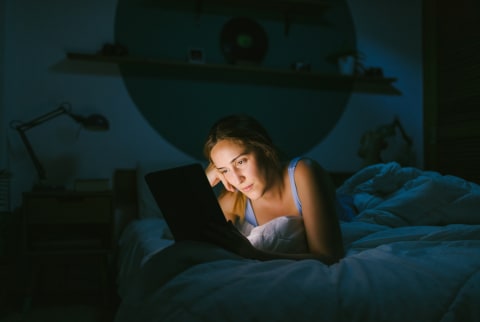Advertisement
Is It Self-Care Or Self-Revenge? The Post-Lockdown Habit To Watch Out For


When lockdown was lifted, Maison Hermès in Guangzhou, China, made about U.S. $2.69 million in sales on reopening day. This quickly became dubbed as revenge spending, not unlike the revenge traveling pattern we've been witnessing, in which people have jumped to take unnecessary trips in response to the world beginning to reopen.
Even if you're still under lockdown, there's another self-revenge trend you may be intimately familiar with—delaying sleep for as long as you can, otherwise known as revenge bedtime procrastination. What we do during this time can range from mindlessly scrolling Instagram to baking to learning a new language. And we can easily lie to ourselves by rebranding this as self-care, productive time, or simply chilling.
Amid reopening and summer's arrival, a lot of people have taken to revenge spending, revenge traveling, and even revenge bedtime procrastination—going on trips, spending a lot of money, and staying up late to indulge and retaliate against the restrictions we had to endure throughout the COVID-19 lockdown. Yet at the heart of it all, these self-revenge activities are fundamentally unhealthy: a symptom of anxiety.
Beyond just retaliating against restrictions, these self-revenge habits are about pushing back against the ongoing uncertainty of the coronavirus pandemic. When will we be able to freely go out and travel again? When can we implement the plans we laid out for this year or decade?
Are you anxious?
If any of the above habits ring true for you, consider this: Most of us don't know we are anxious. I didn't know I was anxious until my body erupted in panic attacks. In my head, anxiety meant hiding in bed all day, chewing down one's nails and being unable to face the world. Not me.
I've met many who claim they are cool and calm—most notably with the unsolicited declaration "I'm not an anxious person"—when in reality they hyperventilate and twist their hands when speaking while complaining of regular migraines. We have become desensitized to anxiety, so we explain it away as everyday stress that we think is part of life.
What I'm really saying here is, it's human to be anxious right now.
Anxiety is about being preoccupied with the future. And not just any future. In your head, you're fixated on the future being the Apocalypse. Then add 40% extra to the worst possible outcome.
Obsess and escape: How anxiety tricks us to self-sabotage.
When we are anxious, we want control. The immediate impulse is to oscillate between obsession and escape. Both help us regain that sense of control—that sweet feeling of instant gratification.
Let's start with obsessing.
Most of us believe that by worrying, we are problem-solving. There is a chasm between them, though. Worrying spins the problem into plenty of catastrophic outcomes; as time passes, we feel even worse for incinerating time and energy. Otherwise, we tackle the problem head-on with a quick fix that's not well thought through. With impulsive solutions, we leave ourselves with bigger messes to clean up.
Contrastingly, problem-solving is really about breaking down the problem into (1) what's going on now, (2) what got me here, and (3) where do I want to be? And then creating the map from here to there via selecting strategies. That's real control.
Then there's escape.
Escape is anything that enables us to numb ourselves—a distraction or self-medication—so we don't have to face our feelings. Unfortunately, a lot of these can also be enjoyable. And so we slap the label of "self-care" upon it.
The problem is, that's really self-soothing, a way of comforting ourselves in the moment that often leads to a bigger long-term cost, as well as a vicious cycle where we learn to become helpless and feel hopeless. These self-revenge behaviors are precisely that form of self-soothing.
In a nutshell, feeling anxious right now makes us sabotage ourselves via self-revenge.
There is a wisdom to pausing—acknowledging what's going on without judging yourself, regrouping your faculties, and then selecting what works best. You spend time to buy more time and sanity rather than plowing through impulsively, led like a bull through your nose ring by your fear center.
The day is not over yet; the year is not over yet.
In one of my all-time favorite essays, writer Alexandra Franzen writes about a day when she'd woken up late and felt dejected. But something flipped inside her that made her step up to the fact that the day was not over yet.
And so she went to yoga, got a massage, connected with friends, and wrote.
All because the day was not over.
If you're in a funk because you've wasted your time, energy, or resources over self-revenge behaviors, you're not alone. The day is not over yet.
You can choose to reclaim your bedtime, instead of letting the vicious cycle of sleeping late and feeling like crap take over. Start by limiting electronics use one hour before bedtime. You can also set an alarm clock to get you to bed.
Likewise, I know many of us started 2020 with grand plans for the year and the decade. It feels as if COVID-19 has derailed our plans majorly. But there are still ways to think, plan, and strategize rather than impulsively spending all your money or taking on unnecessary and still-risky travel plans.
The year is not over yet.

These 6 Simple Steps Will Make The Age Of Aquarius Your Best Era Yet
Perpetua Neo, DClinPsy

These 6 Simple Steps Will Make The Age Of Aquarius Your Best Era Yet
Perpetua Neo, DClinPsy

These 6 Simple Steps Will Make The Age Of Aquarius Your Best Era Yet
Perpetua Neo, DClinPsy

These 6 Simple Steps Will Make The Age Of Aquarius Your Best Era Yet
Perpetua Neo, DClinPsy









